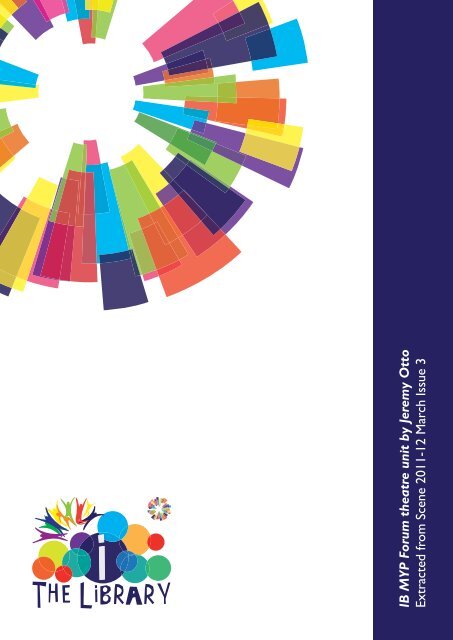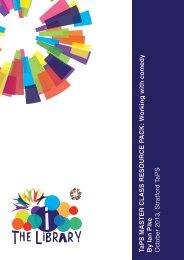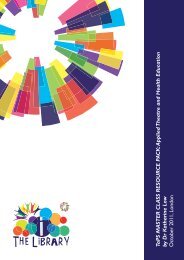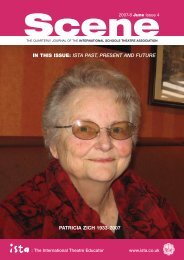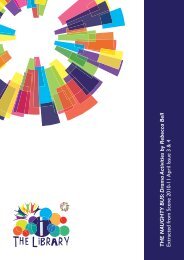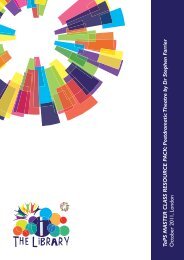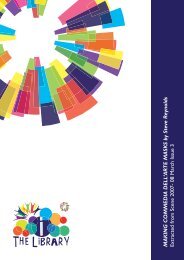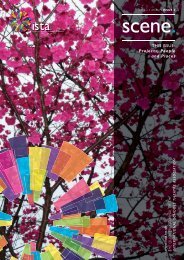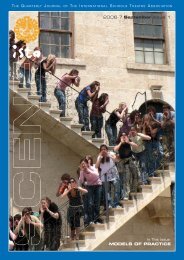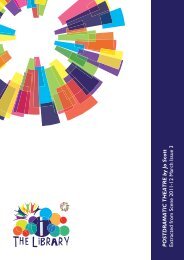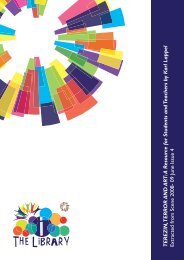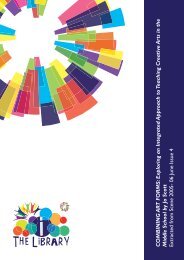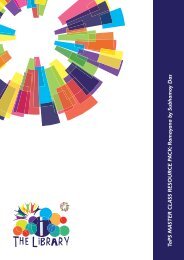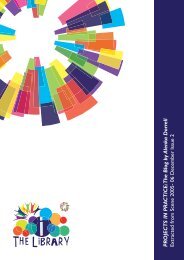IB MYP Forum theatre unit by Jeremy Otto Extracted from ... - Ista
IB MYP Forum theatre unit by Jeremy Otto Extracted from ... - Ista
IB MYP Forum theatre unit by Jeremy Otto Extracted from ... - Ista
Create successful ePaper yourself
Turn your PDF publications into a flip-book with our unique Google optimized e-Paper software.
<strong>IB</strong> <strong>MYP</strong> <strong>Forum</strong> <strong>theatre</strong> <strong>unit</strong> <strong>by</strong> <strong>Jeremy</strong> <strong>Otto</strong><br />
<strong>Extracted</strong> <strong>from</strong> Scene 2011-12 March Issue 3
<strong>IB</strong> <strong>MYP</strong> <strong>Forum</strong> Theatre <strong>unit</strong><br />
By <strong>Jeremy</strong> <strong>Otto</strong><br />
Victoria Shanghai Academy<br />
Year 9 Drama: Weekly Planning 2011-2012<br />
<strong>IB</strong> <strong>MYP</strong> Drama <strong>unit</strong> Year 4 (Year 9)<br />
<strong>unit</strong> Question: Is <strong>theatre</strong> a relevant way to solve problems<br />
AOI: Human ingenuity because students will further develop their ideas on how human minds have infl uenced how we think, work and conduct<br />
relationships and consequently results in mankind to have a desire to create, develop and change oppression.<br />
Significant Concept: Society imposes constraints on people both consciously and subconsciously.<br />
Assessment: Criterion A (Boal Collage), Criterion B (<strong>Forum</strong> Performance), Criterion C (Process Journal) and Criterion D (Personal Engagement)<br />
Interdisciplinary Links: Humanities, Language A and B and Chinese.<br />
Week<br />
One<br />
Two<br />
Three<br />
Four<br />
Double Lesson (100 Minutes)<br />
guiding Question: Hello, how are you<br />
ATL Focus: Collaboration<br />
• Rules and expectations<br />
• Developmental Workbook<br />
• Name Game<br />
• Drama Games<br />
• Re-cap freeze frames and use of space<br />
• Introduce improvisation. Elements of Improvisation – examples <strong>from</strong><br />
Thank God You’re Here and Whose line is it anyway<br />
guiding Question: What will I study and need to do in this<br />
module<br />
What is oppression<br />
ATL Focus: Organisation<br />
• Handout: Course overview<br />
• Go through assessment<br />
• PPT: What is oppression What is status<br />
• Freeze Frames (FF): Create 3 FF that show different forms of status.<br />
• Choose one FF and turn into a role-play.<br />
• Choose one group and Hot Seat the characters (audience to watch<br />
scene and then in DW brainstorm questions to ask)<br />
• Refl ection. Key Questions:<br />
1. What did you do today<br />
2. What were your strengths during todays lesson (Consider the Learner<br />
Profi le)<br />
3. Have you experienced/ witnessed oppression If so, please explain.<br />
4. Did you get any feedback back today on the work you have completed<br />
today in class Record. How will this feedback help you<br />
Developmental Workbook: Find a picture <strong>from</strong> a newspaper or the<br />
internet that shows either a) an oppression or b) someone with higher status<br />
guiding Question: What are issues of oppression relevant to me<br />
How can we solve these problems<br />
ATL Focus: Thinking<br />
• Revise key terms of antagonist, protagonist and oppression.<br />
• Read South China Morning Post (the article was a story written <strong>from</strong> the<br />
perspective of a Filipino helper who was oppressed <strong>by</strong> her employer)<br />
article in small groups.<br />
• When reading, asks students to:<br />
o In one colour- Highlight any words or phrases they do no<br />
o<br />
understand<br />
In another colour- Highlight what their group believes are 5 key<br />
sentences in the article.<br />
• Share and discuss to check for understanding.<br />
• Turn the 5 key sentences into into freeze frames.<br />
• Present and share with class. Add music to create mood.<br />
• Role Play: Students are to link the 5 freeze frames together to create a<br />
role-play.<br />
• Share with class<br />
• Refl ection. Key Questions:<br />
o<br />
o<br />
How relevant is this issue to you<br />
How can this oppression be changed Explain.<br />
guiding Question: How do I create a podcast interview that has a<br />
clear point of view<br />
ATL Focus: Information Literacy, Collaboration and Transfer<br />
• Podcasts Lesson<br />
• See handout<br />
• Homework: Download and listen to at least two podcast interviews.<br />
Single (50 Minutes)<br />
guiding Question: How can I think on my feet<br />
ATL Focus: Communication<br />
• Giving and accepting offers and advancing the action.<br />
• Theatre sport games<br />
• Space jump and Experts<br />
• Refl ection. Key Questions:<br />
o What did I do today<br />
o In terms of improvisation, what are my strengths<br />
o What are my weaknesses How can I improve this<br />
guiding Question: What is an antagonist What is a protagonist<br />
ATL Focus: Information Literacy<br />
• Technology Inquiry: 10 minutes. In groups, fi nd the meanings of<br />
protagonist and antagonist. Students also need to provide 2 examples.<br />
Each group to create an A3 poster of their understanding.<br />
• Present and discuss as a class.<br />
• Improvisation/ Role Play: Based on the stimulus provided, students are to<br />
create a role-play that has a clear protagonist and antagonist.<br />
• Students to share with another group. Other group watching to give<br />
feedback. Key feedback question: Did their scene presented have a clear<br />
antagonist and protagonist What could they do to improve this<br />
• Refl ection alley (if time). No time asks students to complete in DW. Key<br />
Question:<br />
o What did we do today<br />
o What was the feedback that I gave to the group I observed<br />
o How can I use the feedback I was given<br />
guiding Question: How do I create a podcast interview that has a<br />
clear point of view<br />
ATL Focus: Information Literacy, Collaboration and Transfer<br />
• Podcasts Lesson<br />
• See handout<br />
Visual Collage Assessment Notification (Criterion A)<br />
guiding Question: What do I need to do for our assessment<br />
ATL Focus: Reflection<br />
• Explain assessment<br />
• Students to work on their assessment in groups using their computers.<br />
36 Issue 3 | 2011-12 March | Scene
Week<br />
Five<br />
Six<br />
Seven<br />
Eight<br />
Nine<br />
Ten<br />
Eleven<br />
Double Lesson (100 Minutes)<br />
Guiding Question: What is forum <strong>theatre</strong><br />
ATL Focus: Thinking<br />
• Aim to give students understanding of forum <strong>theatre</strong><br />
• Students develop a role-play based on a stimulus.<br />
• Create role play.<br />
• Perform in front of class.<br />
Formative Assessment: Interview and Portfolio<br />
Guiding Questions: How do I engage with a stimulus<br />
How can I ensure that my role-play reflects the stimulus<br />
What is an anti-model<br />
What are “spect-actors” and a “joker”<br />
ATL Focus: Organisation, Collaboration and Transfer<br />
• Formative Assessment Workshop. See Handout<br />
Formative Assessment: Interview and Portfolio<br />
Guiding Questions: How do I engage with a stimulus<br />
How can I ensure that my role-play reflects the stimulus<br />
What is an anti-model<br />
What are “spect-actors” and a “joker”<br />
ATL Focus: Organisation, Collaboration and Transfer<br />
• Formative Assessment Workshop. See Handout<br />
Assessment Notification (Criterion B, C and D)<br />
Guiding Question: What is my assessment and what do I need to do<br />
ATL Focus: Organisation<br />
• Hand out assessment<br />
• Go through rubric<br />
• Form groups<br />
• Show Celtx (Computer based script writing program)<br />
• Choose Stimulus (must be chosen this lesson)<br />
• Process journal (Handout)<br />
• Create an action plan with students with interim deadlines<br />
Guiding question: Is my oppression clear and are there clear<br />
antagonists and protagonists<br />
ATL Focus: Collaboration<br />
• Script writing and rehearsal in groups<br />
• Peer and teacher feedback<br />
• Remind students that their process journals will be checked the following<br />
week.<br />
Guiding question: Does my acting reflect my characters and the<br />
oppression that I need to show<br />
ATL Focus: Thinking<br />
• Memorize script<br />
• Performing for others and the class for feedback (feedback forms)<br />
• Solutions to the problems<br />
<strong>Forum</strong> Theatre Presentation Due (Criterion B and D)<br />
• Students perform assessment in groups.<br />
• When finished, ask students to write their reflection for their final entry<br />
for their process journal.<br />
Single (50 Minutes)<br />
Guiding Question: How is our assessment going<br />
ATL Focus: Reflection<br />
• Drafts due.<br />
• Student and teacher feedback on work.<br />
Visual Collage Assessment Due<br />
Formative Assessment: Interview and Portfolio<br />
Guiding Questions: How do I engage with a stimulus<br />
How can I ensure that my role-play reflects the stimulus<br />
What is an anti-model<br />
What are “spect-actors” and a “joker”<br />
ATL Focus: Organisation, Collaboration and Transfer<br />
• Formative Assessment Workshop. See Handout<br />
Formative Assessment: Interview and Portfolio<br />
Guiding Questions: How do I engage with a stimulus<br />
How can I ensure that my role-play reflects the stimulus<br />
What is an anti-model<br />
What are “spect-actors” and a “joker”<br />
ATL Focus: Organisation, Collaboration and Transfer<br />
• Formative Assessment Workshop. See Handout<br />
Guiding Question: Does my story/ script reflect my stimulus<br />
ATL Focus: Thinking<br />
• Students to write narrative arc<br />
• Peer feedback on work<br />
• Remind students that scripts need to be completed <strong>by</strong> end of the<br />
following week.<br />
Guiding Question: How is my group going What do I need to do<br />
ATL Focus: Communication<br />
• Independent student work<br />
• Script writing and rehearsal<br />
• Process journal check<br />
Guiding question: What do you think<br />
ATL Focus: Reflection<br />
• Peer and teacher feedback<br />
• Feedback forms<br />
Hand in Process Journal (Criterion C)<br />
Guiding Question: Can we answer our <strong>unit</strong> question<br />
ATL Focus: Reflection and Collaboration<br />
• Groups to create posters than answer question<br />
• Present through “Drama” their responses<br />
<strong>Forum</strong> Theatre Unit<br />
Aim:<br />
stimulus. Together, write 6-10 questions that the interviewer could ask<br />
• To create a podcast that interviews a character <strong>from</strong> a stimulus.<br />
the character/s. When you have done this, please show this to your<br />
• To convey a point of view.<br />
teacher. Only when your teacher is happy with this you may move<br />
Guiding Questions:<br />
forward. _______________ (Teacher Initial)<br />
• How do I engage with a stimulus<br />
5. Rehearse your interview. Once you are both satisfied with you<br />
• How can I create a podcast interview that clearly shows the characters interview, create a podcast on Garage Band on your Mac.<br />
point of view<br />
6. When you have finished and you have shown your teacher, click<br />
ATL Focus: Information Literacy, Collaboration and Transfer<br />
SHARE, EXPORT PODCAST TO DISK. Choose MP3 ENCODER<br />
Trans disciplinary Links: English Language A and B<br />
under “Compress Using” and SPOKEN PODCAST under “Audio<br />
Stimulus: SCMP Article: What is the meaning of fair<br />
Settings”. Then click EXPORT. Please save to you desktop.<br />
Instructions:<br />
7. Please give a copy of your podcast to your teacher.<br />
1. Watch the above stimulus.<br />
8. Complete self-reflection (opposite page)<br />
2. Form groups of 3 (maximum).<br />
Homework:<br />
3. Discuss (Answers must be recorded in Developmental Workbook): 1. Go to Mr <strong>Otto</strong>’s VSA learning site.<br />
a. What oppression is being shown<br />
2. Click on year 9 and download at least 2 other podcasts <strong>from</strong> your class.<br />
b. Who are the antagonists and protagonists<br />
3. Listen to the podcasts and be prepared to speak about them in your<br />
c. What could have the protagonist done to prevent the oppression next Drama class.<br />
d. Are there ways to solve this issue<br />
NB Did you know that you can download the podcasts into your iTunes and<br />
4. You are going to create an interview. One student is going to be transfer them to you iPods, iPhones or iPads etc Also, they can be added to<br />
the interviewer and one student is going to be a character <strong>from</strong> the your android devices as well!<br />
www.ista.co.uk Scene | Issue 3 | 2011-12 March 37
guiding Questions:<br />
• How do I engage with a stimulus<br />
• How can I ensure that my role-play refl ects the stimulus<br />
• What is an anti-model<br />
• What are “spect-actors” and a “joker”<br />
ATL Focus: Organisation, Collaboration and Transfer<br />
Trans disciplinary Links: English Language A and B<br />
Stimulus: http://www.youtube.com/watchv=fNumIY9D7uY<br />
Instructions:<br />
1. Form groups of 4 (maximum).<br />
2. Watch the above stimulus.<br />
3. Discuss (Answers must be recorded in DW):<br />
a. What oppression being shown<br />
b. Who are the antagonists and protagonists<br />
c. What could have the protagonist done to prevent the oppression<br />
d. Are there ways to solve this issue<br />
4. Create 4 freeze frames based on the stimulus. Photograph and print.<br />
Stick these pictures into your DW. When you have completed this,<br />
please show your work to your teacher. Only when your teacher is happy<br />
with (including showing your discussion) this may you move forward.<br />
_______________ (Teacher Initial)<br />
5. Design a role-play. Your story must follow the narrative arc as learnt in<br />
English Language A and B, except, you will not show any resolution. Draw this<br />
diagram in your DW and fi ll in the blanks.<br />
Introduction: Set<br />
the scene (context).<br />
Introduce Characters<br />
and Setting<br />
Building Tension:<br />
Show an example of<br />
the oppression take<br />
place.<br />
Resolution: In<br />
forum <strong>theatre</strong>,<br />
you do not see<br />
this. This is for the<br />
audience to decide.<br />
6. Turn your planning into a role-play. When devising and rehearsing, please<br />
ensure that your characters are clear, you have an obvious setting and that<br />
you use the stage/ space correctly (no backs to the audience). You roleplay<br />
needs to go for at least 1.5-2 minutes.<br />
7. Digitally record your role play. Show your role play to another group and<br />
ask for feedback on how to improve.<br />
8. Write the feedback into your DW. Then in your DW write a refl ection of<br />
how you can use this feedback to improve (one paragraph).<br />
9. Once fi nished, show your teacher the following completed tasks:<br />
<strong>Forum</strong> Theatre <strong>unit</strong>: Formative Assessment<br />
Climax:<br />
Show another<br />
moment of the<br />
oppression. Do<br />
not show what<br />
happens<br />
Narrative Arc, Role Play, Recording of your role play and refl ection.<br />
_______________ (Teacher Initial)<br />
10. You are now ready to forum your work as per what Augusto Boal had<br />
created. Please read the passage below on how forum <strong>theatre</strong> works.<br />
Please highlight any words or concepts you do not understand. Find the<br />
meanings of the words/ concepts you do not understand. You can do this<br />
through the Internet or asking your teacher.<br />
How does <strong>Forum</strong> Theatre work<br />
Firstly, the audience is presented with a short play in which they follow the<br />
journey of a character who is being oppressed in some way <strong>by</strong> other characters<br />
in the piece. We observe as he or she deals with the situations presented in ways<br />
that may not be the most effective. The play is presented in its entirety. Once<br />
this is fi nished, the actors will begin the performance once again. This time round<br />
an audience member will call out “Stop!” at the point when they see oppression<br />
occurring, and will replace the actor playing the central character in order to<br />
“try out” a different way of dealing with the situation. The actors in <strong>Forum</strong><br />
Theatre have to be skilled in responding to these interventions. The actors must<br />
stay in character, and use their acting skills to sustain the audience member’s<br />
intervention, while avoiding the trap of letting the person in role “win” when the<br />
action being tried out is not realistic.<br />
Other audience members in turn will try out their strategies for countering<br />
oppression at various points in the play. We watch as the outcome changes in<br />
each scene, depending on the actions and words of the “spect-actor” (Boal’s<br />
term for the participating audience member) and the improvisation of the<br />
actors. The aim is not to discover an ideal solution this would not be true to life<br />
but to encourage the audience to analyse the situation, and to try out strategies<br />
for change. The format encourages a positive and thoughtful approach to<br />
social problems.<br />
Who is the Joker<br />
<strong>Forum</strong> Theatre performances are facilitated <strong>by</strong> a “Joker” who will explain the<br />
concept of <strong>Forum</strong> Theatre to the audience, help out any volunteers who may<br />
be having trouble dealing with the confl ict <strong>by</strong> suggesting alternate responses,<br />
help keep the show moving, and keep the audience focused and attentive. The<br />
Joker serves as a link between the action on stage and the audience, helping<br />
the audience volunteers to sustain their interventions. The Joker must be<br />
sensitive, avoiding being too controlling, while not allowing “magic” solutions or<br />
letting an intervention go on repetitiously or pointlessly.<br />
11. Run a forum <strong>theatre</strong> session with your teacher.<br />
12. Complete the Self Refl ection below.<br />
13. In your Developmental workbook, complete the following tasks:<br />
a. Overall, how well did your group work and why Give examples.<br />
b. Draw a “food” (eg. A pizza) that best describes your own personal<br />
process. For example, I drew a fruit salad because during the week, I<br />
had a lot of variety. The fruit salad has a lot of watermelon because…<br />
c. What colour best describes the work you created and why<br />
14. Show your teacher. _______________ (Teacher Initial)<br />
ATL Self Refl ection (below)<br />
Reflective Statements<br />
I understand/ show understanding of the key concepts taught<br />
in class.<br />
I am confident with creating an interview.<br />
I can work independently and part of a group.<br />
I can use subject knowledge <strong>from</strong> English to inform my work.<br />
I ask questions when I do not understand.<br />
I can adhere to timelines.<br />
I show initiative and can stay on task.<br />
Unsatisfactory<br />
Not at all<br />
Satisfactory<br />
Some<br />
Good<br />
Most<br />
Excellent<br />
All<br />
S T S T S T S T<br />
The street where I live…<br />
Hong Kong is one of those places that even after 5.5<br />
years of living here, never ceases to amaze me. The<br />
city is at times overwhelming and a sensory overload,<br />
but so rewarding in many ways. Every week there is<br />
always something new I discover, whether it is a new<br />
location or a restaurant that I have never seen or eaten<br />
at before. There is truly a vibrancy and cultural diversity<br />
that is exciting and amazing. There is always something<br />
happening, whether it is the Hong Kong Arts Festival,<br />
Rug<strong>by</strong> 7’s, concerts, drinks or dinners! Sometimes<br />
ones social life in Hong Kong can be as hectic as school!<br />
Our apartments may be small but the opport<strong>unit</strong>ies to<br />
travel (basically most destinations are one fl ight away)<br />
are excellent. Hong Kong can nudge you out of your<br />
comfort zone but usually rewards you for it, so if you<br />
come here you have to try the stinky bean curd, sample<br />
the shredded jellyfi sh, brave the hordes at the city centre<br />
horseracing and join in the dawn tai chi. On weekends,<br />
you can escape the city limits and other experiences await<br />
– watching the sun rise <strong>from</strong> a remote mountain peak,<br />
hiking surf-beaten beaches or exploring deserted islands.<br />
38 Issue 3 | 2011-12 March | Scene


